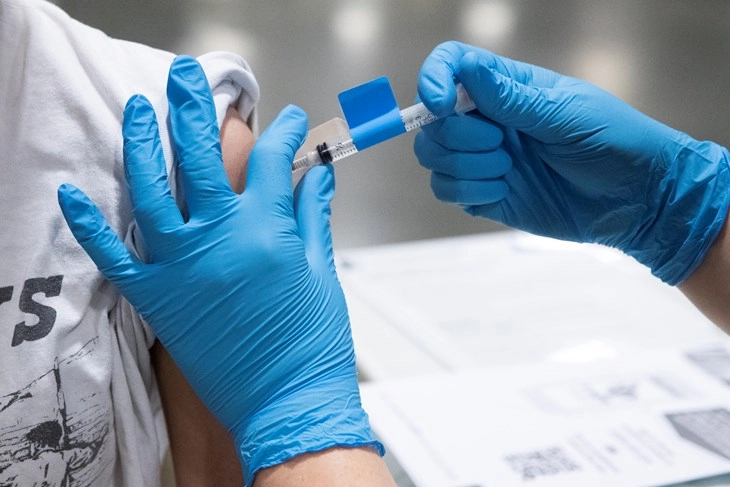Vaccination coverage slightly improved but still below 95%, Ministry working to raise awareness
- The Health Ministry is set to organize an action aimed at raising awareness over the need and benefits of regular vaccination within the frameworks of the European Immunization Week despite the increased vaccination coverage in 2023, Health Minister Ilir Demiri said at a press conference Monday.
- Post By Angel Dimoski
- 17:02, 22 April, 2024

Skopje, 22 April 2024 (MIA) - The Health Ministry is set to organize an action aimed at raising awareness over the need and benefits of regular vaccination within the frameworks of the European Immunization Week despite the increased vaccination coverage in 2023, Health Minister Ilir Demiri said at a press conference Monday.
“An action is being organized, and is already underway, called ‘immunization sprint’ where over 70 teams of doctors and nurses will visit more than 3.000 families with unvaccinated children with a focus on vaccination against pertussis and measles. Additionally, the Health Ministry has secured funds through the Immunization Program for all vaccination sites nationwide in order for Immunization Week to be marked appropriately, with promotional events,” Demiri said.

The Health Minister urged parents to vaccinate their children, because, he said, a high vaccination coverage at an appropriate age leads to collective immunity.
“Through regular vaccination we protect children, our close ones and the broader community against serious diseases. The vaccines are absolutely safe, and the introduction of vaccination as a protective measure against infectious diseases has led to the achievement of the best results in the history of medicine,” Demiri said.
UNICEF Representative to North Macedonia Patrizia DiGiovanni said vaccines are the safest method for the protection of children.
“Today vaccines are estimated to be the most cost-effective means of advancing national welfare and most importantly, vaccines have saved millions of lives. Over the past five decades, vaccines have saved two to three million lives every year. Today we have vaccines for over 20 life-threatening diseases. Still, after three decades we are faced with decreased immunization owing to disinformation over the safety of vaccines,” DiGiovanni said.
Only an immunization coverage of 90 to 95 percent can protect those who aren’t allowed to get vaccinated, the UNICEF Representative said. She urged parents not to wait for epidemics to break out in order to vaccinate and protect their children, but to ensure equal protection for their children as their parents did for them.
The World Health Organization’s (WHO) Special Representative to North Macedonia, Anne Johansen, highlighted the importance of media in the efforts to ensure adequate vaccination coverage.
“Covid had many serious consequences due to the lack of adequate vaccine to provide protection, but also because people who weren’t regularly vaccinated previously were more vulnerable to infection and succumbed to the disease. Without vaccines and vaccination, we can’t teach our immune system how to fight diseases. That’s precisely why parents must understand why vaccines are so important, but also that they are safe,” Johansen said.
She stressed that the country is a leader in the region in many areas, but not in terms of immunization coverage, which, she said, is concerning. Johansen stressed that currently with financial assistance from USAID, the WHO is supporting the “Immunization Sprint” initiative nationwide.
“This initiative aims to improve access and increase coverage in all regions in the country by expanding the availability of vaccination services on the local level, securing vaccination on the spot through mobile vaccination teams on a national level and handing out informational evidence-based materials on immunization. These activities will last until complete vaccination of every individual who meets the conditions,” Johansen said.
Dr. Keti Stavridis from the Public Health Institute said that the vaccination coverage in the country improved slightly in 2023, but is still below the recommended coverage of 95 percent, and below 90 percent for all vaccines.







